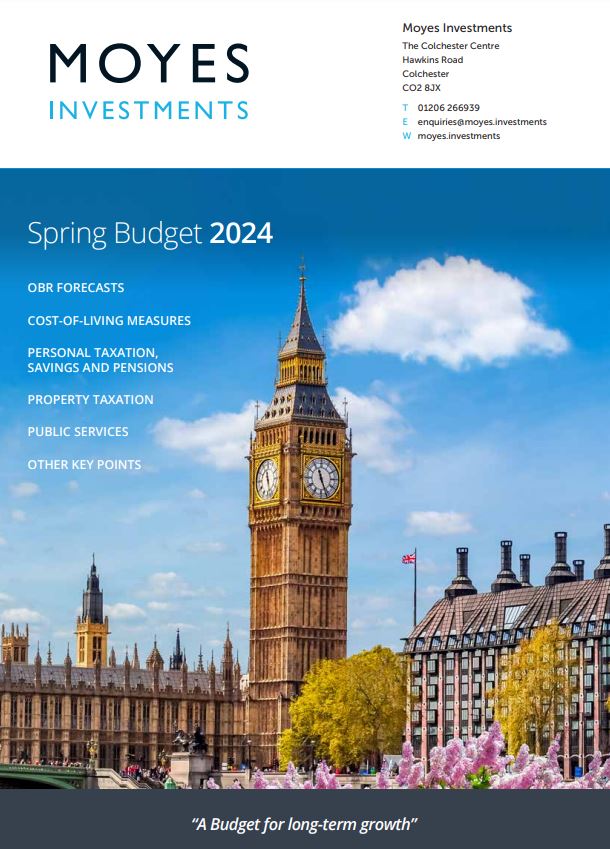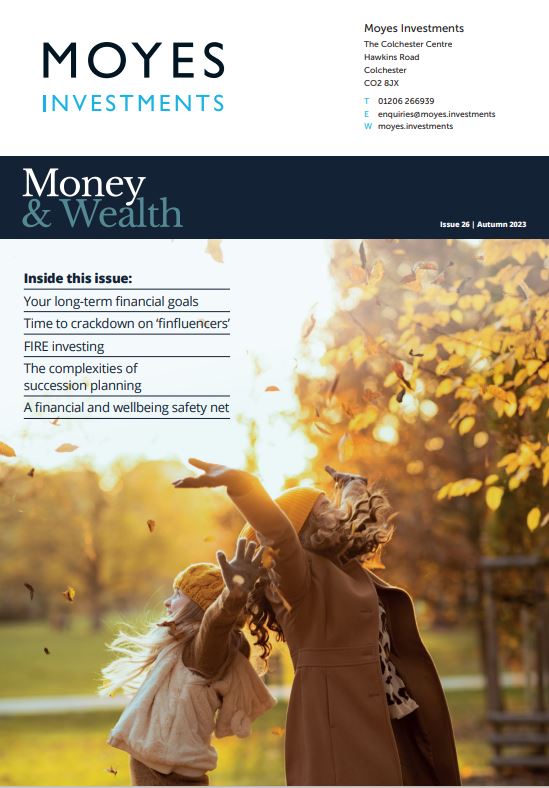Newsletters

Recent Newsletters
Summer 2024
 According to research1, 81% of the UK’s wealthiest individuals are ‘stressed’ about their finances, suggesting financial wellbeing is about more than just the totality of your wealth. So, virtually everyone has concerns about what their financial future will look like.
Planning for the future. The prime concerns for individuals centred around future planning and retirement, specifically maintaining a comparable lifestyle in later life (51%), the value of their investments (39%), providing for future generations (25%), the tax burden (24%) and falling victim to fraud (22%). Interestingly, almost three in five wealthy individuals (59%) in the UK are considering relocating overseas, to enjoy what they regard to be an improved standard of living (36%), lower property costs (28%) and a more favourable tax regime (21%).
The importance of financial wellbeing. Financial wellbeing is more than just having large sums of money. It’s a state of feeling secure and in control of your finances, both now and in the
future. According to the Global Financial Wellbeing Report 20242, across all the countries surveyed, people’s top goal is to ‘feel secure’ (94%), noting that people who feel financially confident are ‘two times more likely to have goals, ambitions and dreams for their life.’
Finding your purpose. While money can’t buy you happiness, as the saying goes, it can give you security and freedom. But to get there, you need to have a plan. A good starting point is to work out what’s most important to you and what you want to achieve. Wealth has the capacity to create a powerful purpose within our lives, provided we are able to unlock its true value by understanding your ‘why’. Once you’ve established this, you can create a plan unique to you that you can work towards with purpose. Unlocking the real value of your wealth We can help you to develop a clear understanding of what you want to achieve with your wealth, as well as provide you with the support and expert advice to help you develop a financial strategy that brings you closer to achieving those goals. There’s no point in worrying about your financial future when you could be taking valuable steps now to take control and face the future with confidence.
1Arbuthnot Latham, 2024, 2nudge, 2024.
Click here to read article in full
According to research1, 81% of the UK’s wealthiest individuals are ‘stressed’ about their finances, suggesting financial wellbeing is about more than just the totality of your wealth. So, virtually everyone has concerns about what their financial future will look like.
Planning for the future. The prime concerns for individuals centred around future planning and retirement, specifically maintaining a comparable lifestyle in later life (51%), the value of their investments (39%), providing for future generations (25%), the tax burden (24%) and falling victim to fraud (22%). Interestingly, almost three in five wealthy individuals (59%) in the UK are considering relocating overseas, to enjoy what they regard to be an improved standard of living (36%), lower property costs (28%) and a more favourable tax regime (21%).
The importance of financial wellbeing. Financial wellbeing is more than just having large sums of money. It’s a state of feeling secure and in control of your finances, both now and in the
future. According to the Global Financial Wellbeing Report 20242, across all the countries surveyed, people’s top goal is to ‘feel secure’ (94%), noting that people who feel financially confident are ‘two times more likely to have goals, ambitions and dreams for their life.’
Finding your purpose. While money can’t buy you happiness, as the saying goes, it can give you security and freedom. But to get there, you need to have a plan. A good starting point is to work out what’s most important to you and what you want to achieve. Wealth has the capacity to create a powerful purpose within our lives, provided we are able to unlock its true value by understanding your ‘why’. Once you’ve established this, you can create a plan unique to you that you can work towards with purpose. Unlocking the real value of your wealth We can help you to develop a clear understanding of what you want to achieve with your wealth, as well as provide you with the support and expert advice to help you develop a financial strategy that brings you closer to achieving those goals. There’s no point in worrying about your financial future when you could be taking valuable steps now to take control and face the future with confidence.
1Arbuthnot Latham, 2024, 2nudge, 2024.
Click here to read article in full
Spring 2024
 On 6 March, Chancellor of the Exchequer Jeremy Hunt delivered his Spring Budget to the House of Commons declaring it was “a Budget for long-term growth.” The fiscal update included a number of new policy measures, such as a widely-anticipated reduction in National Insurance, abolition of the non-dom tax status and new savings products designed to encourage more people to invest in UK assets. The Chancellor said his policies would help build a “high wage, high skill economy” and deliver “more investment, more jobs, better public services and lower taxes.”
OBR forecasts
During his speech, the Chancellor declared that the economy had “turned the corner on inflation” and “will soon turn the corner on growth” as he unveiled the latest economic projections produced by the Office for Budget Responsibility (OBR). He started by saying that they showed the rate of inflation falling below the Bank of England’s 2% target level in “a few months’ time.” He noted that this was nearly a year earlier than the OBR had forecast in the autumn and said this had not happened “by accident” but was due to “sound money” policies. The Chancellor also noted that the OBR forecast shows the government is on track to meet both its self-imposed fiscal rules which state that underlying debt must be falling as a percentage of gross domestic product (GDP) by the fifth year of the forecast and that public sector borrowing must be below 3% of GDP over the same time period. Indeed, in relation to the second rule, Mr Hunt pointed out that borrowing looks set to fall below 3% of GDP by 2025/26 and that by the end of the forecast period it represents the lowest level of annual borrowing since 2001. In terms of growth, Mr Hunt revealed that the updated OBR
projections suggest the UK economy will expand by 0.8% this year, marginally higher than the fiscal watchdog’s autumn
forecast. Next year’s growth rate was also revised upwards to 1.9% compared to the 1.4% figure previously predicted.
Cost-of-living measures
The Chancellor also announced a series of measures designed to help families deal with cost-of-living pressures. These
included: an extension to the Household Support Fund at current levels for a further six months; maintaining the
‘temporary’ 5p cut on fuel duty and freezing it for another 12 months; an extension of the freeze in alcohol duty until
February 2025; an extension in the repayment period for new budgeting advance loans from 12 months to 24 months, and abolition of the £90 charge for a debt relief order.
Click here to read atricle in full
On 6 March, Chancellor of the Exchequer Jeremy Hunt delivered his Spring Budget to the House of Commons declaring it was “a Budget for long-term growth.” The fiscal update included a number of new policy measures, such as a widely-anticipated reduction in National Insurance, abolition of the non-dom tax status and new savings products designed to encourage more people to invest in UK assets. The Chancellor said his policies would help build a “high wage, high skill economy” and deliver “more investment, more jobs, better public services and lower taxes.”
OBR forecasts
During his speech, the Chancellor declared that the economy had “turned the corner on inflation” and “will soon turn the corner on growth” as he unveiled the latest economic projections produced by the Office for Budget Responsibility (OBR). He started by saying that they showed the rate of inflation falling below the Bank of England’s 2% target level in “a few months’ time.” He noted that this was nearly a year earlier than the OBR had forecast in the autumn and said this had not happened “by accident” but was due to “sound money” policies. The Chancellor also noted that the OBR forecast shows the government is on track to meet both its self-imposed fiscal rules which state that underlying debt must be falling as a percentage of gross domestic product (GDP) by the fifth year of the forecast and that public sector borrowing must be below 3% of GDP over the same time period. Indeed, in relation to the second rule, Mr Hunt pointed out that borrowing looks set to fall below 3% of GDP by 2025/26 and that by the end of the forecast period it represents the lowest level of annual borrowing since 2001. In terms of growth, Mr Hunt revealed that the updated OBR
projections suggest the UK economy will expand by 0.8% this year, marginally higher than the fiscal watchdog’s autumn
forecast. Next year’s growth rate was also revised upwards to 1.9% compared to the 1.4% figure previously predicted.
Cost-of-living measures
The Chancellor also announced a series of measures designed to help families deal with cost-of-living pressures. These
included: an extension to the Household Support Fund at current levels for a further six months; maintaining the
‘temporary’ 5p cut on fuel duty and freezing it for another 12 months; an extension of the freeze in alcohol duty until
February 2025; an extension in the repayment period for new budgeting advance loans from 12 months to 24 months, and abolition of the £90 charge for a debt relief order.
Click here to read atricle in full
Winter 2024
 The past few years have been challenging for investors with a series of unforeseen events and rising geopolitical tensions weighing heavily on global markets and, as a new year dawns, many issues remain unresolved. However, while such times are disconcerting for investors, the best way to achieve financial empowerment is by sticking to a sound strategic plan that optimises investment decisions and thereby tackles any potential issues head on.
Geopolitical risk
Although it may sometimes feel we are living through unprecedented times, geopolitical risk is not a new phenomenon
it has always been a feature of the investment landscape. Russia’s invasion of Ukraine and, more recently, the Middle. East conflict, however, are both clearly major events most people did not foresee. And, when such events do occur, even the most well-informed investors find it difficult to accurately predict their impact on markets and investment portfolios.
Economic prospects
The global economy is currently in a relatively precarious position with the long-term consequences of the pandemic,
war in Ukraine and the Middle East, and increasing geoeconomic fragmentation hindering prospects. The International Monetary Fund’s assessment, for example, produced just before October’s Middle East conflict erupted, points to an easing of growth across advanced economies this year, while China looks set to experience its slowest growth rate for years.
Investment pragmatism
While geopolitical events need to be closely monitored, investors must also be disciplined with any changes to investment strategy based on hard facts rather than knee-jerk reactions to the latest news headlines. The key to successful investing is undoubtedly to focus on long-term objectives and mitigate any potential risks by maintaining a well-diversified portfolio spread across different asset classes, industries and geographical regions.
Click here to read article in full
The past few years have been challenging for investors with a series of unforeseen events and rising geopolitical tensions weighing heavily on global markets and, as a new year dawns, many issues remain unresolved. However, while such times are disconcerting for investors, the best way to achieve financial empowerment is by sticking to a sound strategic plan that optimises investment decisions and thereby tackles any potential issues head on.
Geopolitical risk
Although it may sometimes feel we are living through unprecedented times, geopolitical risk is not a new phenomenon
it has always been a feature of the investment landscape. Russia’s invasion of Ukraine and, more recently, the Middle. East conflict, however, are both clearly major events most people did not foresee. And, when such events do occur, even the most well-informed investors find it difficult to accurately predict their impact on markets and investment portfolios.
Economic prospects
The global economy is currently in a relatively precarious position with the long-term consequences of the pandemic,
war in Ukraine and the Middle East, and increasing geoeconomic fragmentation hindering prospects. The International Monetary Fund’s assessment, for example, produced just before October’s Middle East conflict erupted, points to an easing of growth across advanced economies this year, while China looks set to experience its slowest growth rate for years.
Investment pragmatism
While geopolitical events need to be closely monitored, investors must also be disciplined with any changes to investment strategy based on hard facts rather than knee-jerk reactions to the latest news headlines. The key to successful investing is undoubtedly to focus on long-term objectives and mitigate any potential risks by maintaining a well-diversified portfolio spread across different asset classes, industries and geographical regions.
Click here to read article in full
Autumn 2023
 After more than a decade of putting up with paltry savings rates, the sharp increase in rates over the past two years has certainly brought considerable cheer to savers. However, while the rise is welcome, it is important savers do not overly rely on cash savings but carry on investing if they are to maximise returns and achieve their long-term financial goals.
Think holistically
Although the availability of higher rates has provided a boost to cash savings, assessing the appropriate amount to hold in rainy-day funds is always difficult, particularly given recent cost-of-living
pressures. However, history suggests holding too much money in cash can hold back your future wealth, as returns on both bonds and equities have a better long-term record in terms of outpacing inflation.
Time in the market
History also suggests long periods out of the market increase investors’ chances of underperforming. This is because, while cash rates may look attractive, knowing when to sell and buy back into the market is extremely difficult if not impossible, particularly when markets are volatile. The best approach is therefore usually to stay in the market and build a portfolio capable of capitalising on any improved outlook in order to maximise potential long-term gains.
Don’t be intimidated
Another reason why some people might shy away from investing is because they feel overawed. Indeed, a recent survey1 found that half of the UK population admits to being intimidated by investing, with more respondents saying it would be easier to learn a new language than start investing. On a more positive note, however, other research2
recently showed growth in the uptake of regulated financial advice, with 4.4 million UK adults seeking advice in 2022, up from 3.8 million two years earlier.
Here to help
And of course, we’re always here for you; so, if you need any advice get in touch and we’ll help you build an investment strategy focused squarely on your future dreams and aspirations. Lloyds Bank, July 2023, 2FCA, July 2023
Click here to read article in full
After more than a decade of putting up with paltry savings rates, the sharp increase in rates over the past two years has certainly brought considerable cheer to savers. However, while the rise is welcome, it is important savers do not overly rely on cash savings but carry on investing if they are to maximise returns and achieve their long-term financial goals.
Think holistically
Although the availability of higher rates has provided a boost to cash savings, assessing the appropriate amount to hold in rainy-day funds is always difficult, particularly given recent cost-of-living
pressures. However, history suggests holding too much money in cash can hold back your future wealth, as returns on both bonds and equities have a better long-term record in terms of outpacing inflation.
Time in the market
History also suggests long periods out of the market increase investors’ chances of underperforming. This is because, while cash rates may look attractive, knowing when to sell and buy back into the market is extremely difficult if not impossible, particularly when markets are volatile. The best approach is therefore usually to stay in the market and build a portfolio capable of capitalising on any improved outlook in order to maximise potential long-term gains.
Don’t be intimidated
Another reason why some people might shy away from investing is because they feel overawed. Indeed, a recent survey1 found that half of the UK population admits to being intimidated by investing, with more respondents saying it would be easier to learn a new language than start investing. On a more positive note, however, other research2
recently showed growth in the uptake of regulated financial advice, with 4.4 million UK adults seeking advice in 2022, up from 3.8 million two years earlier.
Here to help
And of course, we’re always here for you; so, if you need any advice get in touch and we’ll help you build an investment strategy focused squarely on your future dreams and aspirations. Lloyds Bank, July 2023, 2FCA, July 2023
Click here to read article in full
)
Moyes Investments is a trading name of Moyes Financial Planning Ltd. We are directly regulated by the Financial Conduct Authority. Our Financial Services number is 571590 and this can be verified by the online FCA Register – www.fca.org.uk/register
The Financial Ombudsman Service (FOS) is an agency for arbitrating on unresolved complaints between regulated firms and their clients. Further details can be found on www.financial-ombudsman.org.uk
The guidance and/or advice contained within the website is subject to the UK regulatory regime and is therefore primarily targeted at customers in the UK





